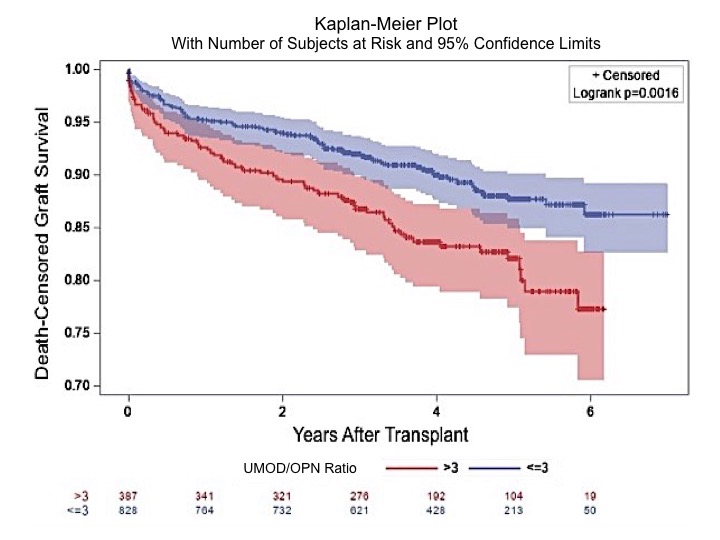Uromodulin to Osteopontin Ratio in Deceased Donor Urine is Associated with Kidney Graft Outcomes
1Yale, New Haven, CT, 2Johns Hopkins, Baltimore, MD, 3UPenn, Philadelphia, PA, 4Univ of Utah, Salt Lake City, UT, 5Indiana Univ, Bloomington, IN, 6Cornell, New York, NY, 7Univ of Michigan, Ann Arbor, MI, 8Montefiore, Bronx, NY, 9Univ of Maryland, College Park, MD, 10Drexel, Philadelphia, PA, 11Columbia, NY, NY, 12Univ Hosp, Ulm, Germany, 13Thomas Jefferson, Philadelphia, PA, 14St. Barnabas, Livingston, NJ
Meeting: 2020 American Transplant Congress
Abstract number: 202
Keywords: Graft failure, Kidney transplantation
Session Information
Session Name: Biomarkers, Immune Assessment and Clinical Outcomes II
Session Type: Oral Abstract Session
Date: Saturday, May 30, 2020
Session Time: 3:15pm-4:45pm
 Presentation Time: 3:51pm-4:03pm
Presentation Time: 3:51pm-4:03pm
Location: Virtual
*Purpose: Deceased-donor kidneys often experience extensive injury, activating adaptive and maladaptive pathways. While these adaptive and maladaptive mechanisms are initiated in donor kidneys prior to implantation, they have a durable impact on subsequent graft function. Uromodulin (UMOD) and Osteopontin (OPN) are two proteins frequently evaluated in the setting of acute kidney injury (AKI) and other kidney diseases such as nephrocalcinosis. The biological effects of these two proteins, which are specifically produced in AKI, range from repair of cells, activating immune cells and crystal formation in the kidneys. We hypothesize that these two proteins play an important role in determining graft outcomes.
*Methods: We randomly divided our cohort of deceased donors and recipients into a training and a test dataset with 1215 recipients in each to internally validate the associations between UMOD and OPN, measured in donor urine at time of organ procurement, with death-censored graft failure (dcGF). Given that the direction of association between UMOD and dcGF opposed that of OPN, we evaluated the ratio of UMOD to OPN with outcomes.
*Results: During a median (IQR) follow-up of 4 (3-5) years, 33 (30-37) per 1000 patient-years experienced dcGF. Doubling of UMOD minimally increased dcGF risk with an adjusted hazard ratio (aHR) of 1.1 (95% CI:1.02-1.2), whereas doubling of OPN decreased dcGF risk [aHR 0.94 (0.88-1)]. UMOD to OPN ratio ≤ 3 was associated with 43% decreased risk of dcGF [aHR 0.57 (0.41-0.80)] in the training dataset. We observed no interaction with donor AKI for any of the biomarker associations. We observed similar associations of the UMOD to OPN ratio with dcGF in the test dataset.
*Conclusions: A UMOD to OPN ratio ≤3 was protective against dcGF. This ratio can potentially supplement existing strategies for evaluating quality of kidneys and assist with allocation of kidneys in deceased-donor kidney transplantation.
To cite this abstract in AMA style:
Mansour SG, Liu C, Jia Y, Reese P, Hall I, El-Achkar T, LaFavers K, Obeid W, Thangamani M, Rosenberg A, Doshi M, Akalin E, Bromberg J, Harhay M, Mohan S, Schröppel B, Daneshpajouhnejad P, Singh P, Weng F, Thiessen-Philbrook H, Parikh C. Uromodulin to Osteopontin Ratio in Deceased Donor Urine is Associated with Kidney Graft Outcomes [abstract]. Am J Transplant. 2020; 20 (suppl 3). https://atcmeetingabstracts.com/abstract/uromodulin-to-osteopontin-ratio-in-deceased-donor-urine-is-associated-with-kidney-graft-outcomes/. Accessed July 9, 2025.« Back to 2020 American Transplant Congress

